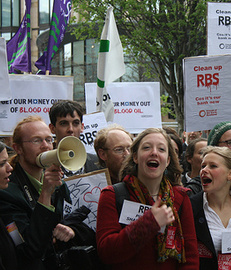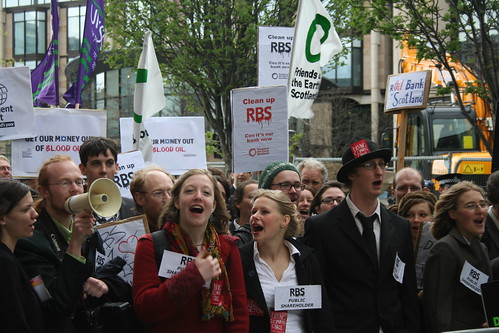In 2007 People & Planet and Platform launched a campaign for the Royal Bank of Scotland to stop funding fossil fuel extraction and “ditch dirty development”, with groups across the country putting on talks, asking difficult questions at careers fairs, protesting at branches. Various activists including those from the Rising Tide network held a day of action that autumn hitting local press, plastering cash machines, and shutting down several branches. Back then, climate denial was a still valid currency for the bank and that familiar green-wash sheen was only just being cooked up.
Within months they has closed their website “www.oilandgasbank.com”, changed their stance on global warming, signs went up in their branches proclaiming their sustainable policies, and careers fair staff were given lines to say to respond to criticism.
The campaign gathered steam at the 2008 RBS AGM, as Student Unions started changing bank accounts, removing RBS advertising from their premises, and calling for disinvestment.
When the Government bailed out the bank in late 2008 they asked no questions about their investments, and Westminster MPs, prompted by constituent People & Planet and World Development Movement members, started to ask why Government money was going into a bank that was directly eroding Government policies. The UK Treasury was now under the spotlight. A legal challenge was launched about their takeover with backing from Leigh Day & Co solicitors, and during the aftermath of the G20 meeting in London, Pandas made national news “cleaning up” the 2009 AGM, and later the Treasury during the London Climate Camp.
By then, the primarily public owned bank had poured billions into coal and tar sands exploitation, and the campaign was growing. The World Development Movement, Platform and People & Planet were still asking questions about front-line fossil fuel extraction, but Amnesty International was also was calling on the bank to own up to investing in companies causing human rights abuses, and Friends of the Earth Scotland wanted an explanation for its links with companies like Conoco Phillips, poisoning First Nation communities in Canada.
This week, standing together with indigenous people of Athabasca, that coalition has become a truly powerful force for change.
Everyone can be proud of their part in this campaign which has taken finance from being a disregarded industry into the spotlight as a true root cause of social and environmental injustice. We look to the summer, with a Climate Camp focused on the bank’s activities, with eager anticipation. This aint over yet.


Leave a Reply